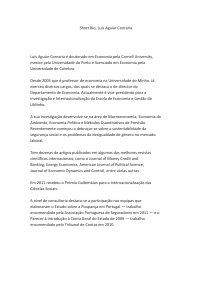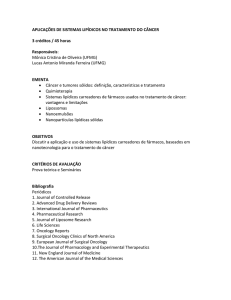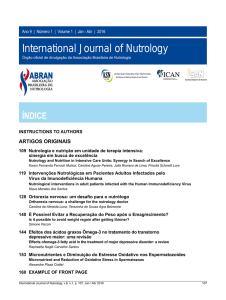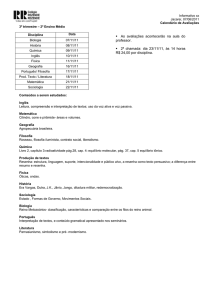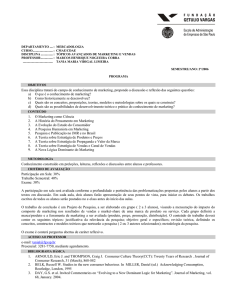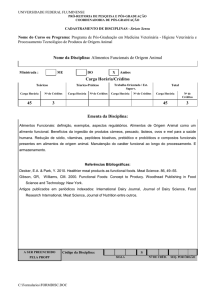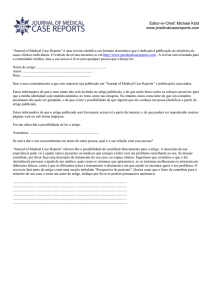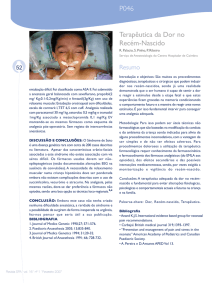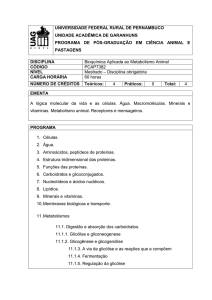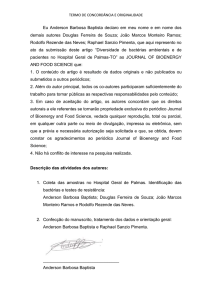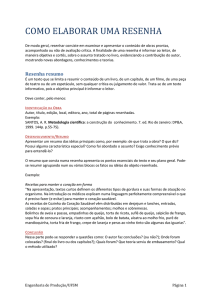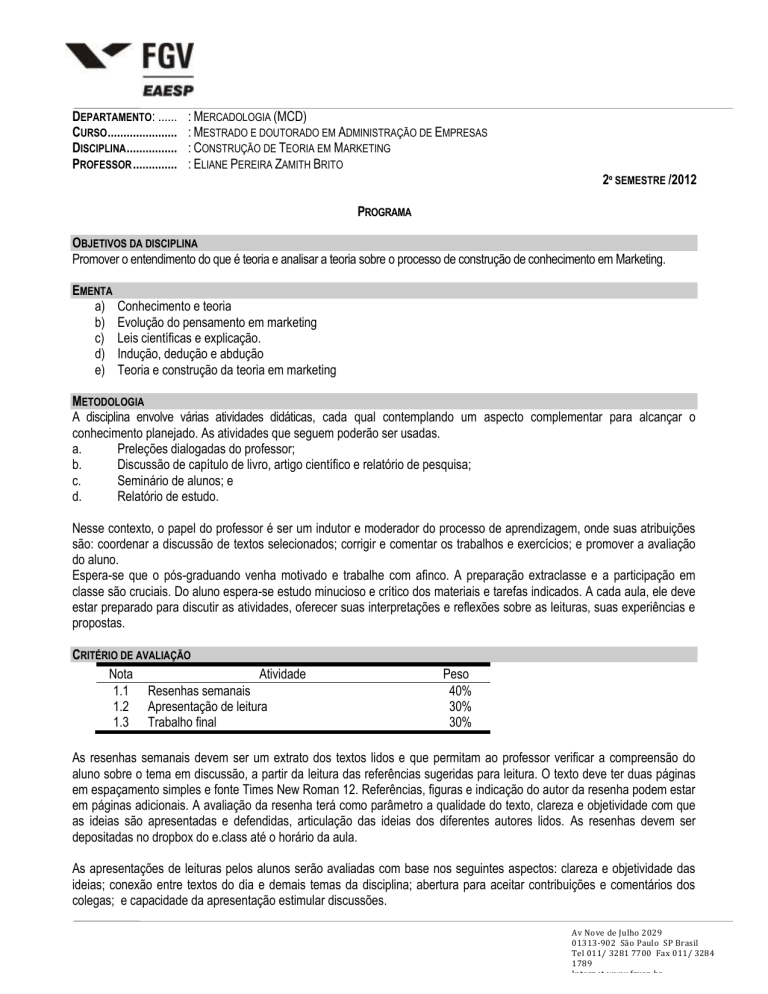
DEPARTAMENTO: ......
CURSO ......................
DISCIPLINA ................
PROFESSOR ..............
: MERCADOLOGIA (MCD)
: MESTRADO E DOUTORADO EM ADMINISTRAÇÃO DE EMPRESAS
: CONSTRUÇÃO DE TEORIA EM MARKETING
: ELIANE PEREIRA ZAMITH BRITO
2º SEMESTRE /2012
PROGRAMA
OBJETIVOS DA DISCIPLINA
Promover o entendimento do que é teoria e analisar a teoria sobre o processo de construção de conhecimento em Marketing.
EMENTA
a)
b)
c)
d)
e)
Conhecimento e teoria
Evolução do pensamento em marketing
Leis científicas e explicação.
Indução, dedução e abdução
Teoria e construção da teoria em marketing
METODOLOGIA
A disciplina envolve várias atividades didáticas, cada qual contemplando um aspecto complementar para alcançar o
conhecimento planejado. As atividades que seguem poderão ser usadas.
a.
Preleções dialogadas do professor;
b.
Discussão de capítulo de livro, artigo científico e relatório de pesquisa;
c.
Seminário de alunos; e
d.
Relatório de estudo.
Nesse contexto, o papel do professor é ser um indutor e moderador do processo de aprendizagem, onde suas atribuições
são: coordenar a discussão de textos selecionados; corrigir e comentar os trabalhos e exercícios; e promover a avaliação
do aluno.
Espera-se que o pós-graduando venha motivado e trabalhe com afinco. A preparação extraclasse e a participação em
classe são cruciais. Do aluno espera-se estudo minucioso e crítico dos materiais e tarefas indicados. A cada aula, ele deve
estar preparado para discutir as atividades, oferecer suas interpretações e reflexões sobre as leituras, suas experiências e
propostas.
CRITÉRIO DE AVALIAÇÃO
Nota
Atividade
1.1 Resenhas semanais
1.2 Apresentação de leitura
1.3 Trabalho final
Peso
40%
30%
30%
As resenhas semanais devem ser um extrato dos textos lidos e que permitam ao professor verificar a compreensão do
aluno sobre o tema em discussão, a partir da leitura das referências sugeridas para leitura. O texto deve ter duas páginas
em espaçamento simples e fonte Times New Roman 12. Referências, figuras e indicação do autor da resenha podem estar
em páginas adicionais. A avaliação da resenha terá como parâmetro a qualidade do texto, clareza e objetividade com que
as ideias são apresentadas e defendidas, articulação das ideias dos diferentes autores lidos. As resenhas devem ser
depositadas no dropbox do e.class até o horário da aula.
As apresentações de leituras pelos alunos serão avaliadas com base nos seguintes aspectos: clareza e objetividade das
ideias; conexão entre textos do dia e demais temas da disciplina; abertura para aceitar contribuições e comentários dos
colegas; e capacidade da apresentação estimular discussões.
Av Nove de Julho 2029
01313-902 São Paulo SP Brasil
Tel 011/ 3281 7700 Fax 011/ 3284
1789
Internet www.fgvsp.br
O aluno deve escolher um conceito de marketing para desenvolver seu trabalho final. Minha sugestão é que o aluno
escolha um conceito de sua pesquisa de dissertação ou tese, caso já tenha o tema de sua pesquisa, ou um conceito que
gostaria de entender melhor como forma de ajudar na sua definição de tema de estudo. Analisar a(s) definição (ões) do
conceito e fazer uma representação crítica sobre sua inserção na teoria da área – quão desenvolvido é o conceito, quais
conceitos estão relacionados a ele compondo uma teoria da área, as hipóteses ou suposições existentes nesta teoria. As
controvérsias na(s) teoria(s) relacionadas ao conceito. Os trabalhos serão avaliados pela qualidade do texto, das
referências escolhidas para embasar o desenvolvimento (referências nacionais também) e pela reflexão demonstrada. O
texto poderá ter até 10 páginas em espaçamento simples e fonte Times New Roman 12. O texto deverá ser entregue na
última aula e na 7ª semana o aluno terá 5 minutos da aula para expor aos colegas sua escolha de conceito, o porquê da
escolha e como está estruturando o trabalho. Prepare uma apresentação de até 5 slides, a qual deverá ser usada como
apenas como suporte para as explicações.
PLANO DE AULAS
Dia
Tema
06agosto
Ciência
13/agosto
Teoria de marketing
20/agosto
Teoria de marketing
27/agosto
Teoria de marketing
03/setembro Realismo
10/setembro Relativismo
Referências
Hunt (2003, cap 2)
Sheth, Gardner e Garrett (1988, cap. 1, 2 e 3)
Sheth, Gardner e Garrett (1988, cap 4, 5 e 6)
Kassarjian e Goodstein (2010)
Wilkie e Moore (2003)
Staelin (2005)
Shapiro (2005)
Möller, Pels e Saren (2010)
Vargo e Lusch (2010)
Hunt (2003, cap 3 e 9)
Miller e Tsang (2010)
Hunt (2003, cap 4 e 5)
17/setembro Apresentação alunos Individuais
24/setembro Pesquisa e marketing Hunt (2003, cap 6 a 8)
Hunt (2002, cap 3 e 4)
01/outubro Explicação
Zaltman, LeMasters e Heffring (1982, cap. 3)
Haig (2003)
Zaltman, LeMasters e Heffring (1982, cap. 5)
Indução, dedução e
22/outubro
Blaikie (2010, cap 4)
abdução
Walton (2004, cap 1)
29/outubro Convidado
Hunt (2002, cap.5 e 6)
05/novembro Leis científicas
Leone e Schultz (1980)
Hubbard e Lindsay (2002)
Hunt (2002, cap. 7 e 8)
12/novembro Teoria
Sutton e Staw (1995)
Whetten (1989)
Lehmann (2005)
Periódicos e
Polonsky e Whitelaw (2005)
19/novembro disseminação do
Hult, Reimann and Schilke (2009)
conhecimento
Hofacker, Gleim e Lawson (2009)
Stremersch, Verniers e Verhoef (2007)
Tarefa
Ler a referência e fazer resenha (+/- 2 páginas)
Ler os capítulos e fazer resenha (+/- 3 páginas)
Ler os capítulos e fazer resenha (+/- 3 páginas)
Ler os capítulos e fazer resenha (+/- 3 páginas)
Ler e fazer resenha
Ler e fazer resenha
Fazer draft trabalho final e apresentar para a
classe (vale 40% da nota do trabalho final)
Ler e fazer resenha
Ler e fazer resenha
Ler e fazer resenha
Ler e fazer resenha
Ler e fazer resenha
Em duplas propor uma metodologia para fazer a
qualificação de periódicos no Brasil incluindo
periódicos editados no Brasil (5 páginas) para
apresentar aos colegas.
REFERÊNCIAS
Blaikie, N. (2010). Designing social research. 2nd Ed. Cambridge: Polity Press.
Haig, B. D. (2003). What is spurious correlation?, Understanding Statistics, 2 (2), 125-132.
Hofacker, C. F.; Gleim, M.R.; Lawson, S. J. (2009). Revealed Reader Preference for Marketing Journals, Journal of the Academy of
Marketing Science, 37 (Summer), 238-247.
Hubbard, R.; Lindsay, R.M. How the emphasis on ‘original’ empirical marketing research impedes knowledge development.
Marketing Theory, Thousand Oaks, v.2, n.4, p.381-402, Dec. 2002.
Hult, G. T.M.; Reimann, M.; Schilke, O. (2009). Worldwide Faculty Perceptions of Marketing Journals: Rankings, Trends,
Comparisons, and Segmentation, Global Edge Business Review, 3 (3), 1-23.
Hunt, S.D. (2002). Foundations of Marketing Theory: Toward a General Theory of Marketing. Armonk, NY: M. E. Sharpe.
Hunt, S.D. (2003). Controversy in Marketing Theory: For reason, realism, truth, and objectivity. Armonk, NY: M. E. Sharpe.
Kassarjian, H.H.; Goodstein, R.C. (2010). The emergence of consumer research. In MacIaran, P; Saren, M., Stern, B.; Tadajewski.
The Sage handbook of Marketing Theory. Los Angeles: Sage.
Lehmann, D. (2005). Journal Evolution and the Development of Marketing. Journal of Public Policy & Marketing. 24(1), 137-142.
Leone, R.P.; Schultz, R.L. (1980). A Study of Marketing Generalization, Journal of Marketing, 44 (Winter), 10-18.
Miller, K. D.; Tsang, E. W. K. (2010). Testing management theories: Critical realist philosophy and research methods.
Strategic Management Journal, 32(2): 139–158.
Möller, K.; Pels, J.; Saren, M. (2010). The Marketing theory or theories into Marketing? Plurality of research traditions and
paradigms. In MacIaran, P; Saren, M., Stern, B.; Tadajewski. The Sage handbook of Marketing Theory. Los Angeles: Sage.
Vargo, S. L.; Lusch, R. F. (2010). A service-dominant logic for Marketing. In MacIaran, P; Saren, M., Stern, B.; Tadajewski. The Sage
handbook of Marketing Theory. Los Angeles: Sage.
Polonsky, M.J.; Whitelaw, P. (2005). What are We Measuring When We Evaluate Journals? Journal of Marketing Education, 27
(August), 189-201.
Searle, J. (1991). Intentionalistic Explanations in the Social Sciences, Philosophy of the Social Science, 21 (Sep), 332-344.
Shapiro, S.J. (2005). Looking Backward--and Ahead, Journal of Public Policy & Marketing, 24 (Spring), 117-120.
Sheth, J.N.; Gardner, D. M.; Garrett, D.E. (1988). Marketing Theory: Evolution and Evaluation. New York, NY: John Wiley and Sons.
Staelin, R. (2005). Eras III and IV: My Reflections. Journal of Public Policy & Marketing, 24 (Spring), 146-149.
Stremersch, S.; Verniers, I.; Verhoef, P.C. (2007). The Quest for Citations: Drivers of Article Impact, Journal of Marketing, 71 (July),
171-193.
Sutton, R.I.; Staw, B.M. (1995). What Theory is Not, Administrative Science Quarterly, 40 (September), 371-384.
Walton, D. (2004). Abdutive reasoning. Tuscaloosa: The University of Alabama Press.
Whetten, D.A. (1989). What Constitutes a Theoretical Contribution, Academy of Management Review, 14 (4), 490-495.
Wilkie, W.L.; Moore, E.S. (2003). Scholarly Research in Marketing: Exploring the '4 Eras' of Thought Development,Journal of Public
Policy and Marketing, 22 (Fall), 116-146.
Zaltman, G.; LesMasters, K.; Heffring, M. (1982). Theory Construction in Marketing: Some Thoughts on Thinking. New York, NY:
John Wiley and Sons.
BIBLIOGRAFIAS ADICIONAIS
AMA Task Force (1988). Developing, Disseminating, and Utilizing Marketing Knowledge, Journal of Marketing, 52 (October), 1-25.
Anderson, P.F. (1983). Marketing, Scientific Progress, and Scientific Method, Journal of Marketing, 47 (Fall), 18-31.
Bartels, R. (1951). Can Marketing Be a Science? Journal of Marketing, 15 (January), 319-328.
Bartels, R. (1970). Marketing Theory and Metatheory. Homewood, IL: Richard D. Irwin, Inc.
Bourgeois, L. J., III (1979). Toward a Method of Middle-Range Theorizing, Academy of Management Review, 4 (3), 443-447.
Conant, J. B. (1958). Ciencia e senso comum. São Paulo: Clássico-Científica.
Deligonul, Z. S.; Cavusgil, S. T. (1997). Does the Comparative Advantage Theory of Competition Really Replace the Neoclassical
Theory of Perfect Competition? Journal of Marketing, 61 (October), 65-73.
Fischer, R.B. (1975). Definitions of Science, in Science, Man, and Society (2nd ed.). Philadelphia, PA: W. B. Saunders, 3-10.
Guidry, J.A.; Hollier, B.N.G.; Johnson, L.; Tanner, J.R.; Veltsos, C., (2004). Surveying the Cites: A Ranking of Marketing Journals
Using Citation Analysis, Marketing Education Review, 14 (Spring), 45-59.
Hodgson, G. (2000). The Marketing of Wisdom: Resource-Advantage Theory, Journal of Macromarketing, 20 (June), 68-72.
Holbrook, M.B. (1995). The Four Faces of Commodification in the Development of Marketing Knowledge, Journal of
Marketing Management, 11, 641-654.
Hollander, S.C.; Rassuli, K.M. ; Jones, D. G. B.; Dix, L.F. (2005). Periodization in Marketing History, Journal of Macromarketing, 25
(June), 32-41.
Hunt, S.D. (1976). The Nature and Scope of Marketing, Journal of Marketing, 40 (July), 17-28.
Hunt, S.D. (1988). Comment (on the AMA Task Force Study), Journal of Marketing, 52 (October), 42-47.
Hunt, S.D. (2000). A General Theory of Competition: Too Eclectic or Not Eclectic Enough? Too Incremental or Not Incremental
Enough? Too Neoclassical or Not Neoclassical Enough? Journal of Macromarketing, 20 (June), 77-81.
Hunt, S.D.; Morgan, R. M. (1997). Resource-Advantage Theory: A Snake Swallowing Its Tail or a General Theory of Competition?
Journal of Marketing, 61 (October), 74-82.
Koojaroenprasit, N.; Weinstein, A.; Johnson, W.C.; Remington, D.O. (1998). Marketing Journal Rankings Revisited: Research
Findings and Academic Implications, Marketing Education Review, 8 (Spring), 95-101.
LeShan, L.; Henry M. (1982). Einstein's Space and Van Gogh's Sky: Physical Reality and Beyond. New York, NY: Collier Books.
McKenzie, C. J.; Wright, S.; Ball, D. F.; Baron, P. J. (2002). Commentary: The Publications of Marketing Faculty--Who are We
Really Talking To? European Journal of Marketing, 36 (11/12), 1196-1208.
Midgley, D. (2002). What to Codify: Marketing Science or Marketing Engineering? Marketing Theory, 2 (4), 363-368.
Murray, J.B.; Evers, D.J.; Janda, S. (1995). Marketing, Theory Borrowing, and Critical Reflection, Journal of Macromarketing, 15
(Fall), 92-106.
Mulvaney, R. J. (2009). Classic philophical questions. (13th edition). New Jersey: Prentice Hall.
Myers, J.G.; Greyser, S.A.; Massy, W.F. (1979). The Effectiveness of Marketing's R&D For Marketing Management: An
Assessment, Journal of Marketing, 43 (January), 17-29.
Peattie, K.; Prothero, A.(1992). The Marketing Message: Being Broadcast Load and Clear? Journal of Marketing
Management, 8, 21-34.
Rossiter, J. R. (2001). What is Marketing Knowledge? Stage I: Forms of Marketing Knowledge, Marketing Theory, 1 (1), 9-26.
Rossiter, J. R. (2002). The Five Forms of Transmissible, Usable Marketing Knowledge, Marketing Theory, 2 (4), 369-380.
Savitt, R (2000). A Philosophical Essay about A General Theory of Competition: Resources, Competences, Productivity, Economic
Growth, Journal of Macromarketing, 20 (June), 73-76.
Shaw, E. H.; Tamilia, R.D. (2001). Robert Bartels and the History of Marketing Thought, Journal of Macromarketing, 21 (December),
156-163.
Sheth, J.N.; Sisodia, R.S. (1999). Revisiting Marketing's Lawlike Generalizations, Journal of the Academy of Marketing Science, 27
(Winter), 71-87.
Simon, H.A. (1968). On Judging the Plausibility of Theories, in Logic, Methodology and Philosophy of Science III. Amsterdam: NorthHolland Publishing Co., 25-45.
Skipper, R.; Hyman, M.R. (1990). Marketing and Logical Deduction, Journal of Marketing, 54 (April), 89-92.
Uncles, M. (2002). From Marketing Knowledge to Marketing Principles, Marketing Theory, 2 (4), 345-353.
Webster, F. E. (1988) Comment (on the AMA Task Force Study), Journal of Marketing, 52 (October), 48-51
Weick, K.E. (1989). Theory Construction as Disciplined Imagination, Academy of Management Review, 14 (4), 516-531.
Wierenga, B. (2002). On Academic Marketing Knowledge and Marketing Knowledge that Marketing Managers Use for Decisionmaking, Marketing Theory, 2 (4), 355-362.
Zeithaml, V.A.; Varadarajan, P. R.; Zeithaml, C. P. (1988). The Contingency Approach: Its Foundations and Relevance to Theory
Building and Research in Marketing, European Journal of Marketing, 22 (7), 37-64.
Ziman, J. (1968). What Is Science? in Introductory Readings in the Philosophy of Science, Klemke, et al., eds. Buffalo, NY:
Prometheus Books, 35-54.


